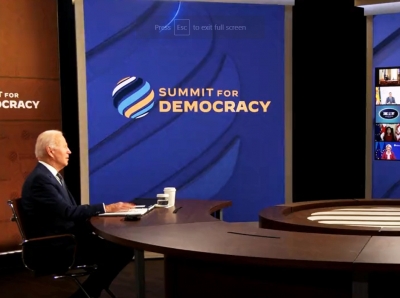By Asad Mirza Last week, the US hosted a two-day virtual democracy summit.This summit was promised last year by President Joe Biden, who wanted to demonstrate that America has moved away from Donald Trump’s “America First” philosophy.
Instead of focusing on immediate results and expanding democracy’s reach, it will be more about starting a conversation around how to stop backsliding.
Biden announced with other leaders initiatives to stop autocracies misusing big technology to suppress dissent and improve election integrity.
He also urged independent media to support his modest efforts, which the president stated would help “seed fertile soil for democracy to blossom around the globe”.
He acknowledged, however that the path ahead for democracy was not easy due to rising authoritarianism across the globe.
He said, “We are aware of the challenges ahead but also that we can handle them,” in closing remarks.
Biden was criticised for the list of guests at the summit, and the fact that it was focused on China and Russia rather than other autocratic countries.
It also failed to invite the leaders from the Middle East.
Chinese and Russian CriticismChina and Russia strongly criticized the summit.
Their ambassadors wrote a joint essay before the event.The Biden administration’s decision not to host the summit was criticized by both China and Russia.
Their ambassadors wrote a joint essay before the gathering.
China was furious at Taiwan’s participation and produced a lengthy white paper describing the benefits of China’s model of democracy.
The paper emphasized that democracy is not a fixed form and can be manifested in many ways.The West, however, promotes the One Person One Vote principle and party competition as the only criteria for democracy.
The White House was also subject to scrutiny regarding the invitations of nations to the summit.CIVICUS Monitor is a monitoring group for civic freedoms around the world.
It found that only 5% live in countries where free speech and protest are respected.
Many countries were invited due to serious human rights or anti-democratic concerns that have been raised by US State Department and civil society groups, including India, Pakistan, Ukraine, Poland and the Philippines.
Freedom House has detailed Washington’s incoherence on this issue more clearly in its report 2021 on political freedoms.Hungary is ranked at “partially-free” with a score of sixty nine.
Ukraine gets an even lower score, scoring sixty.This is a continuation of its slow decline in the last several years.India has a score of sixty-seven, the Philippines is fifty-six and Kosovo is fifty-four.Pakistan’s score stands at a depressing thirty-seven.This keeps it out of the “unfree”.
Critics claim that Washington used this tactic to invite smaller democratic countries to the summit to allow them to follow its lead in important international matters.
Jen Psaki (White House Press Secretary) said that the invitations were not meant to be a stamp of approval but the administration’s wish for a wide range of voices, faces, and representatives in the discussions.
The US stanceAs per the protagonists of The Summit for Democracy, it had a larger geopolitical ambition.
It reflects a prominent view within the Biden administration that assembling a global coalition of democracies can counter China’s rise and continued Russian aggression.
Biden has repeatedly made a case that the like-minded allies and US need to show the world that democracies are a far better vehicle for societies than autocracies.
It is a central tenet of Biden’s foreign policy outlook.But his first year in office has been a period that he says has been marked by a “backward slide” for democracy around the globe.
The initiative, also called for establishing a voluntary written code of conduct meant to guide government and tech companies on human rights criteria for export and licensing policy.Under the global charter for digital public goods, governments, civil society groups, software engineers and tech companies would declare principles for open source tech products.
Biden also pledged that the US would spend up to $424 million in the next year around the world to support independent media, anti-corruption work and more.
However, the choice of panellists to reflect US’s views also courted controversy.
Brad Smith, president of Microsoft, spoke on how to use ‘technology for democracy’.John Brothers, president of the billionaire investment giant T.Rowe Price, which holds a massive portion of Venezuelan debt, moderated a discussion on ‘responsible investment’.Kent Walker, president of Global Affairs for Google, which has publicly admitted to censoring the World Socialist Web Site, spoke of how private enterprises can aid ‘democracy.’ Critics assert that the people who could be described as holding a completely contrary position on these issues were invited to speak on how to tackle them, which seems quite farcical.
Biden said it was also a moment for the United States to look inward about shoring up its own democratic institutions, he said, that the sacred right to vote, to vote freely, the right to have your vote counted is the threshold liberty for democracy.
But this dos not match with what is really happening in the US, movements like Black Lives Matter raised the issue of racial and colour discrimination, on which the Summit was completely silent.
The overall conclusion seems to be that the Summit for Democracy would have been more effective had it remained focused on strengthening and defending democracy rather than highlighting contradictions between democracies and authoritarian rules.
As some critics pointed out behind the pretences of defending democracy against meddling autocrats, lies Washington’s drive to maintain its global economic hegemony.The case for democracy is simple: Democracy is the only political vehicle, which could protect minority voices while also protecting the rights of journalists, citizens, and opposition leaders to criticise their government.It also underlined the continuous efforts by President Biden to leave a political legacy.
(Asad Mirza is a political commentator based in New Delhi.
He writes on Muslims, educational, international affairs, interfaith and current affairs.)
asad/ksk/
#Summit #Democracy #Delhi #Joe Biden #Washington #China #Washington #Russia #America #Google #Microsoft #Democratic
.






